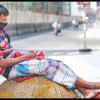Post-Covid price inflation drives up poverty

At least 27.51 lakh more Bangladeshis fell into poverty in 2022 due to the global food price hike and post Covid-19 impacts, according to a paper by a researcher at the International Food Policy Research Institute (IFPRI).
"The Covid-19 was the main driver of higher poverty in Bangladesh. But the world price spike in 2022 directly raised the cost of living for many households," Angga Pradesha, a senior scientist at the Foresight and Policy Modeling Unit at IFPRI, said in a presentation at the BIDS conference in Dhaka yesterday.
A global slowdown in 2023 might further worsen the poverty situation in Bangladesh, the paper warned, adding that most people falling into poverty anew are from rural areas.
The findings come at a time when Bangladesh is struggling to tame a rising food price inflation, as a large number of people continue to line up in long queue to buy government-subsidised food items in different parts of the country.
In August, food inflation soared to 12.54 percent -- the highest since October 2011, when it stood at 12.82 percent, according to data from Bangladesh Bureau of Statistics. Food inflation fell to 10.76 percent in November.
Pradesha shared the findings virtually in a session yesterday at the Annual BIDS Conference on Development taking place at Lakeshore Hotel in the capital. Bangladesh Institute of Development Studies (BIDS) organised the three-day flagship event that will conclude today.
In his analysis of the poverty scenario in low and lower-middle income country, the IFPRI official estimated the impacts of major global crises since 2020, including Covid and rising global prices, using secondary data.
The researcher said the Covid pandemic reversed Bangladesh's Gross Domestic Product (GDP) growth trends in 2020. And the recovery slowed as global prices spiked in 2022.
"Recovery may be further hampered by a slowdown in the global economy in 2023," he said.
As purchasing power fell, people, especially those in the lower-income group, consumed less.
This ultimately worsened undernourishment scenario in 2022 in all the 17 countries studied. Other countries that were studied include Burkina Faso, Cambodia, Ethiopia, Ghana, Kenya and Nepal.
"World price spikes are also more important for hunger than for GDP. The Covid-19 caused across-the-board income losses, whereas rising global prices directly raised food prices and reduced households' access to food," he said, touching on Bangladesh's hunger scenario.
Like the poverty rate, worsening hunger situation is also more pervasive in rural areas in Bangladesh, the paper noted.
According to the key findings of the Household Income and Expenditure Survey (HIES) 2022, Bangladesh's poverty rate stands at 18.7 percent at national level; it is 20.5 percent in rural areas and 14.7 percent in urban areas.
The overall extreme poverty rate is 5.6 percent -- 6.5 percent in rural areas and 3.8 percent in urban areas, according to the HIES data.
Only a year ago in 2021, a study by Power and Participation Research Centre (PPRC) and Brac Institute of Governance and Development (BIGD) found 2.45 crore people, or 14.75 percent of the population, were pushed into poverty in a single year.
The findings were based on a Rapid Response Research (RRR), which was conducted in March 2021 on more than 6,000 people living in rural and urban slums.
Earlier in late 2020, South Asian Network on Economic Modeling (Sanem) found that 42 percent of 5,577 households covered in a nationwide survey fell below the poverty line on Covid impacts.
The non-profit organisation had interviewed the same group of households in 2018, when it found 21.6 percent of them were below the poverty line.
BIGD Executive Director Imran Matin said there has been a lot of recovery in the post-Covid period, but the recovery mechanism is fragile.
"This foundation is very weak," he told The Daily Star yesterday.
As a result, the rising cost of living and inflation, along with economic mismanagement, have aggravated people's hardship.
"If it continues, the situation may worsen, as we still could not create a sustainable social protection system," he said.

 For all latest news, follow The Daily Star's Google News channel.
For all latest news, follow The Daily Star's Google News channel. 





Comments